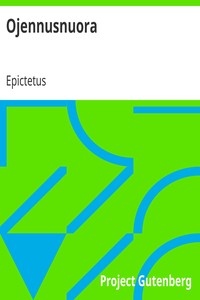Ojennusnuora by Epictetus
"Ojennusnuora" by Epictetus is a philosophical work written in the early 2nd century AD. This text embodies the principles of Stoic thought, centering on the distinction between what is within our control and what is not, advocating for personal freedom and inner peace through self-discipline and virtue. Epictetus’s teachings, which are primarily captured through the notes of his pupil Arrian, emphasize the importance of mindset in achieving tranquility and resilience against life's
adversities. The opening of "Ojennusnuora" introduces the core tenets of Epictetus's philosophy, focusing on the distinction between what is and is not under our control. He elaborates that our thoughts, desires, and actions are within our power, while external factors such as bodily health, possessions, and the opinions of others are not. The text encourages readers to align their desires and aversions with what they can control, advising that undue attachment to externalities leads to suffering. Through various aphorisms, the beginning establishes a framework for cultivating a stoic mindset, urging readers to prioritize mental fortitude over the transient nature of external circumstances. (This is an automatically generated summary.)
Read or download for free
| How to read | Url | Size | |||
|---|---|---|---|---|---|
| Read now! | https://www.gutenberg.org/ebooks/16620.html.images | 101 kB | |||
| EPUB3 (E-readers incl. Send-to-Kindle) | https://www.gutenberg.org/ebooks/16620.epub3.images | 105 kB | |||
| EPUB (older E-readers) | https://www.gutenberg.org/ebooks/16620.epub.images | 105 kB | |||
| Kindle | https://www.gutenberg.org/ebooks/16620.kf8.images | 212 kB | |||
| older Kindles | https://www.gutenberg.org/ebooks/16620.kindle.images | 188 kB | |||
| Plain Text UTF-8 | https://www.gutenberg.org/ebooks/16620.txt.utf-8 | 87 kB | |||
| Download HTML (zip) | https://www.gutenberg.org/cache/epub/16620/pg16620-h.zip | 106 kB | |||
| There may be more files related to this item. | |||||
Similar Books
About this eBook
| Author | Epictetus, 55-135 |
|---|---|
| Translator | Jaakkola, K. (Kaarle Kustaa), 1853-1932 |
| Title | Ojennusnuora |
| Note | Reading ease score: 36.3 (College-level). Difficult to read. |
| Note | Wikipedia page about this book: https://fi.wikipedia.org/wiki/K%C3%A4sikirja_(Epiktetos) |
| Credits | Produced by Matti Jarvinen, Tuija Lindholm and Distributed Proofreaders Europe |
| Language | Finnish |
| LoC Class | B: Philosophy, Psychology, Religion |
| LoC Class | PA: Language and Literatures: Classical Languages and Literature |
| Subject | Conduct of life -- Early works to 1800 |
| Subject | Ethics, Ancient |
| Category | Text |
| EBook-No. | 16620 |
| Release Date | Aug 29, 2005 |
| Most Recently Updated | Dec 12, 2020 |
| Copyright Status | Public domain in the USA. |
| Downloads | 174 downloads in the last 30 days. |
| Project Gutenberg eBooks are always free! | |

